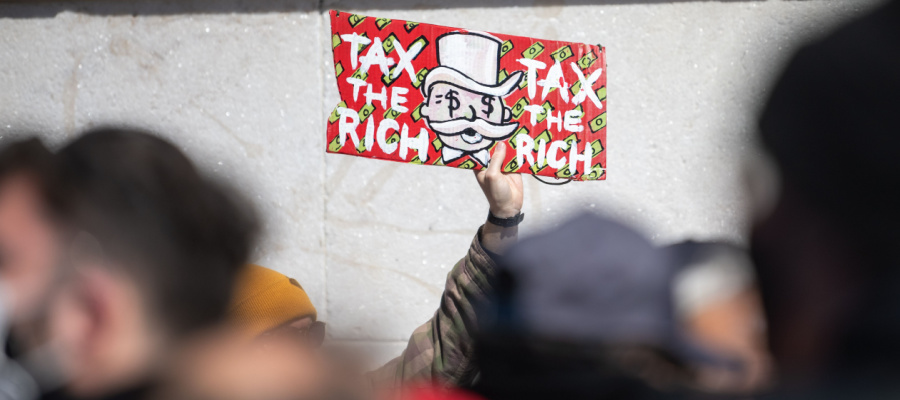Brace yourself for more stale arguments on taxes

What will happen if a new BC government raises taxes on rich individuals and corporations as the NDP promised in its election platform? If years of finger-wagging from pundits and the business lobby can be believed, you might assume the sky will come crashing down—right onto the BC economy.
It’s an argument that’s been hammered into our collective political consciousness over the past few decades. Even before a new government is sworn in, the Fraser Institute has started ringing alarm bells about threats to “tax competitiveness” in the province as well as spreading objectively false claims that the NDP-Green deal proposes to raise taxes on average families.
It seems that almost anything goes in BC’s neoliberal era. Pile on user fees and MSP health premiums on the middle class? No problem. Shift sales taxes onto consumers via the HST? Sure—if you can get away with it. Stop building affordable housing and watch housing costs spin out of control? Go for it.
But want to make the rich pay more taxes? That’s a different story.
Even before a new government is sworn in, the Fraser Institute has started ringing alarm bells.
In a province that has seen spectacular wealth generation in recent years—highly concentrated into the hands of a few—redistribution has been off the political agenda.
Take a look at how BC’s personal tax system has changed over the past 16 years.
The richest 1% of households now pockets an average of $39,000 annually thanks to tax cuts brought in since 2000. Much of this goes into buying stocks and driving up real estate prices. What does get spent is not likely to be in the local economy, instead going to imported luxury goods and holidays. In contrast, households in the bottom 50% “gain” only $53 per year on average.
We’ve also seen large tax cuts for business over the same period, with the provincial corporate tax rate dropping from 16.5% to 11%, and an additional $600 million in business tax breaks in Budget 2017.
So, would increasing the corporate tax rate by 1%, as proposed by the NDP platform, leave BC businesses sagging under an unfair burden?
Far from it. BC has the lowest rate in Canada—a country that has also seen major federal corporate tax cuts over the past 20 years. For small businesses, the rate is much lower still.
According to rankings by the global accounting firm KPMG, Canada is the second-lowest-cost country in which to do business among 10 major industrialized economies. And Vancouver is one of the five lowest-cost jurisdictions in which to do business among 111 global cities.
In short, BC’s business sector is not overtaxed.
The lack of affordable housing—a flipside of low taxes—is a far bigger impediment to businesses and individuals locating in Vancouver.
In short, BC’s business sector is not overtaxed. We can increase the general corporate tax rate and stay comfortably in the middle of the pack among our provincial and international economic counterparts.
Ditto on the personal tax side. BC has the lowest marginal tax rate on high incomes in the country—hence that huge tax cut flowing into the pockets of the richest 1% each year. Restoring the 16.8% top bracket, as proposed by the NDP platform, would be a modest measure in the right direction, moving BC towards the low-middle end of the pack among Canadian provinces in terms of taxing top incomes.
In fact, the outgoing BC Liberal government temporarily set the top rate at the exact same level in 2014 and 2015, without any fuss or evidence of negative economic effects.
What about the argument that if taxes on the rich are slashed under Donald Trump’s administration in the US, Canadians will suddenly start flocking south?
As Lars Osberg put it in a 2015 CCPA report, “Talk is cheap, but actually moving means giving up the public services… The affluent like many of the things—such as pothole-free roads, nice parks and crime-free public spaces—that tax dollars enable, and they can afford to live where they want to.”
If anything, top talent seems wary about moving to the political tinderbox that is the United States.
BC has the lowest marginal tax rate on high incomes in the country.
Universal healthcare is also a major competitive advantage for Canada compared to the US, where employers and individuals are often saddled with paying exorbitant private health insurance costs, as SFU economist Rhys Kesselman recently pointed out.
Kesselman also notes that skyrocketing housing costs are a major vulnerability for BC, since “businesses must offer higher pay to attract and retain employees or limit their hiring and expansion.” Taxes on speculative money in the housing market are crucial components of the solution, rather than posing a threat to BC’s economy, he explains.
If BC’s going to tackle the major challenges we face—unaffordable housing and child care, persistent poverty and inequality, overstretched public services, climate change and many more—we can and must require that the wealthiest few pay more in taxes.
In the months ahead, expect to be served up more breathless claims that such policies are the road to ruin, particularly from vested interests themselves. But these arguments have gone stale.
There’s something better on the menu.


